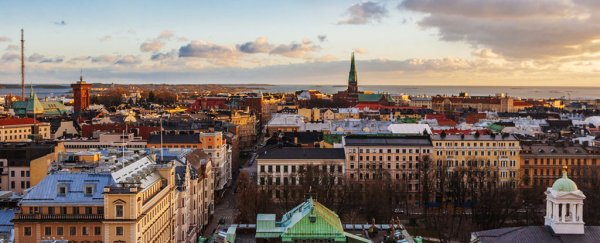Finland has been ranked as the most socially progressive country in the world, while the US dropped three spots, barely hanging in the top 20 in 19th place.
While it's easy to look at the amount of wealth countries generate as a measure of how well they're doing, economic markers like gross domestic product (GDP) don't tell the whole story, missing out on things people actually need to enjoy a comfortable life – like healthcare, housing, education, and political freedoms.
"The Social Progress Index proves that GDP is not destiny," said Michael Green, Executive Director of the Social Progress Imperative, the US-based nonprofit behind the rankings. "We need more countries to be like Costa Rica, which squeezes a lot of social progress out of its modest GDP."
Costa Rica's modest GDP per capita is just US$14,232, but the nation amounts to the world's biggest over-achiever when it comes to social progress measures. Costa Rica came in at 28th on the list of 133 countries ranked in the report, but it's surrounded by significantly wealthier counterparts. We've posted an infographic below (high-res version here), summarising many of the key findings.
And while the US at 19th may be almost 10 spots higher on the list – having dropped three positions since its 2015 ranking – when you consider the nation's dramatically greater GDP of US$52,118, it's a result that the Social Progress Imperative describes as ultimately "disappointing".
"It's difficult to escape the conclusion that this is yet another disappointing result for the US and that citizens are getting a pretty raw deal when it comes to translating the country's wealth into social progress," said Green.
According to the researchers, the US is the only major western democracy ranking among the most significant under-performers – relative to GDP – putting it alongside China, Russia, Iran, Nigeria, and Saudi Arabia.
It's in stark contrast to the US's neighbour Canada, which rose from 6th place last year to occupy 2nd position in the 2016 Index. The top 10 as a whole looks like this:
- Finland
- Canada
- Denmark
- Australia
- Switzerland
- Sweden
- Norway
- Netherlands
- United Kingdom
- Iceland / New Zealand (with equal scores)
It's worth noting that Iceland in equal 10th place was recently also singled out as the most peaceful place on Earth – for the sixth year in a row no less.
The Index measures social progress using 53 indicators across areas including personal safety, environmental quality, personal freedom and choice, and nutrition and basic medical care.
In terms of these kinds of basic necessities, the average social progress of every citizen on the planet is equivalent to that of a person living in Mongolia in Central Asia, which came in at 80th, in the lower middle social progress category.
While Nordic countries tend to dominate these kinds of lists – and do so again on this occasion, with five of the top 12 countries coming from that region of the world – the high rankings of non-Nordic nations show that all sorts of countries can boost their overall quality of life.
"This year's Index demonstrates that you don't need to be from a Nordic nation to enjoy very high levels of social progress," said Green. "Policy-makers around the world would do well to look at countries like Canada and Australia to learn what leaders are successfully doing to improve the lives of their citizens."
And while they're at it, they should look at areas where the world as a whole struggles. This includes generally poor observance of personal rights, tolerance and inclusion. Other challenges include environmental quality, and health and wellness – which the researchers note does not necessarily improve as nations become wealthier.
You can see more information from the Social Progress Index 2016 in the infographic below (high-res version here), including charts comparing countries' performance relative to GDP and lots more too, and the full report is available here.
 Social Progress Imperative
Social Progress Imperative
